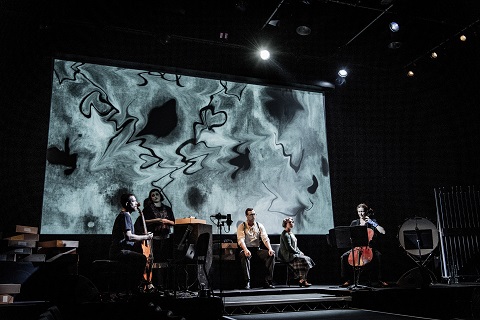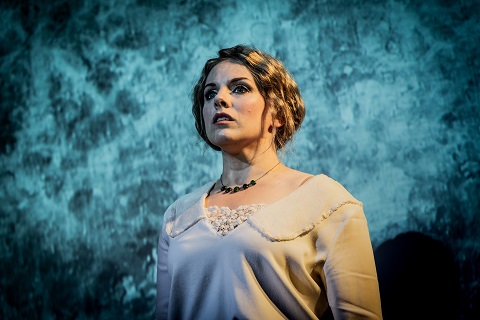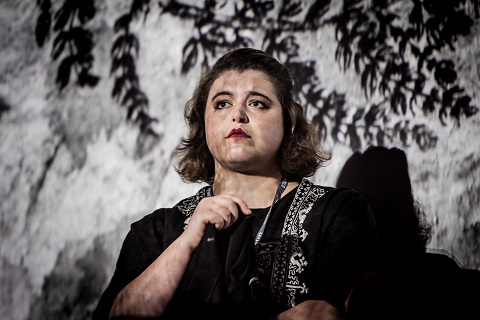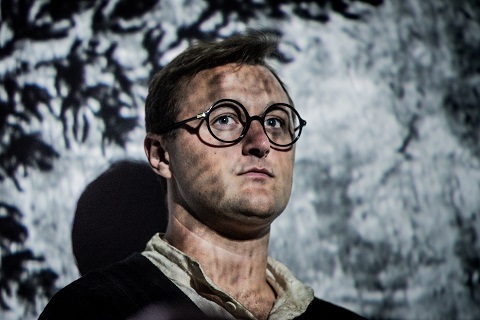
23 Sep 2019
Dear Marie Stopes: a thought-provoking chamber opera
“To remove the misery of slave motherhood and the curse of unwanted children, and to secure that every baby is loved before it is born.”
English Touring Opera are delighted to announce a season of lyric monodramas to tour nationally from October to December. The season features music for solo singer and piano by Argento, Britten, Tippett and Shostakovich with a bold and inventive approach to making opera during social distancing.
This tenth of ten Live from London concerts was in fact a recorded live performance from California. It was no less enjoyable for that, and it was also uplifting to learn that this wasn’t in fact the ‘last’ LfL event that we will be able to enjoy, courtesy of VOCES8 and their fellow vocal ensembles (more below …).
Ever since Wigmore Hall announced their superb series of autumn concerts, all streamed live and available free of charge, I’d been looking forward to this song recital by Ian Bostridge and Imogen Cooper.
The Sixteen continues its exploration of Henry Purcell’s Welcome Songs for Charles II. As with Robert King’s pioneering Purcell series begun over thirty years ago for Hyperion, Harry Christophers is recording two Welcome Songs per disc.
Although Stile Antico’s programme article for their Live from London recital introduced their selection from the many treasures of the English Renaissance in the context of the theological debates and upheavals of the Tudor and Elizabethan years, their performance was more evocative of private chamber music than of public liturgy.
In February this year, Albanian soprano Ermonela Jaho made a highly lauded debut recital at Wigmore Hall - a concert which both celebrated Opera Rara’s 50th anniversary and honoured the career of the Italian soprano Rosina Storchio (1872-1945), the star of verismo who created the title roles in Leoncavallo’s La bohème and Zazà, Mascagni’s Lodoletta and Puccini’s Madama Butterfly.
Evidently, face masks don’t stifle appreciative “Bravo!”s. And, reducing audience numbers doesn’t lower the volume of such acclamations. For, the audience at Wigmore Hall gave soprano Elizabeth Llewellyn and pianist Simon Lepper a greatly deserved warm reception and hearty response following this lunchtime recital of late-Romantic song.
Collapsology. Or, perhaps we should use the French word ‘Collapsologie’ because this is a transdisciplinary idea pretty much advocated by a series of French theorists - and apparently, mostly French theorists. It in essence focuses on the imminent collapse of modern society and all its layers - a series of escalating crises on a global scale: environmental, economic, geopolitical, governmental; the list is extensive.
For this week’s Live from London vocal recital we moved from the home of VOCES8, St Anne and St Agnes in the City of London, to Kings Place, where The Sixteen - who have been associate artists at the venue for some time - presented a programme of music and words bound together by the theme of ‘reflection’.
'Such is your divine Disposation that both you excellently understand, and royally entertaine the Exercise of Musicke.’
Amongst an avalanche of new Mahler recordings appearing at the moment (Das Lied von der Erde seems to be the most favoured, with three) this 1991 Mahler Second from the 2nd Kassel MahlerFest is one of the more interesting releases.
‘And there was war in heaven: Michael and his angels fought against the dragon; and the dragon fought and his angels, And prevailed not; neither was their place found any more in heaven … that old serpent … Satan, which deceiveth the whole world: he was cast out into the earth, and his angels were cast out with him.’
If there is one myth, it seems believed by some people today, that probably needs shattering it is that post-war recordings or performances of Wagner operas were always of exceptional quality. This 1949 Hamburg Tristan und Isolde is one of those recordings - though quite who is to blame for its many problems takes quite some unearthing.
There was never any doubt that the fifth of the twelve Met Stars Live in Concert broadcasts was going to be a palpably intense and vivid event, as well as a musically stunning and theatrically enervating experience.
‘Love’ was the theme for this Live from London performance by Apollo5. Given the complexity and diversity of that human emotion, and Apollo5’s reputation for versatility and diverse repertoire, ranging from Renaissance choral music to jazz, from contemporary classical works to popular song, it was no surprise that their programme spanned 500 years and several musical styles.
The Academy of St Martin in the Fields have titled their autumn series of eight concerts - which are taking place at 5pm and 7.30pm on two Saturdays each month at their home venue in Trafalgar Square, and being filmed for streaming the following Thursday - ‘re:connect’.
The London Symphony Orchestra opened their Autumn 2020 season with a homage to Oliver Knussen, who died at the age of 66 in July 2018. The programme traced a national musical lineage through the twentieth century, from Britten to Knussen, on to Mark-Anthony Turnage, and entwining the LSO and Rattle too.
With the Live from London digital vocal festival entering the second half of the series, the festival’s host, VOCES8, returned to their home at St Annes and St Agnes in the City of London to present a sequence of ‘Choral Dances’ - vocal music inspired by dance, embracing diverse genres from the Renaissance madrigal to swing jazz.
Just a few unison string wriggles from the opening of Mozart’s overture to Le nozze di Figaro are enough to make any opera-lover perch on the edge of their seat, in excited anticipation of the drama in music to come, so there could be no other curtain-raiser for this Gala Concert at the Royal Opera House, the latest instalment from ‘their House’ to ‘our houses’.
"Before the ending of the day, creator of all things, we pray that, with your accustomed mercy, you may watch over us."

“To remove the misery of slave motherhood and the curse of unwanted children, and to secure that every baby is loved before it is born.”
Such was the ‘best New Year resolution’ that birth control advocate and sex-advice writer Dr Marie Carmichael Stopes (1880-1958) ever made, according to archival material from the Wellcome Collection. Stopes’ words form the closing lines of Alex Mills’ chamber opera, Dear Marie Stopes, which was presented at Kings Place this weekend, following the premiere in August 2018 in the Reading Library of the Wellcome Collection, as part of that year’s Tête à Tête festival.
In December 1929, advertisements appeared in several British journals announcing the publication of Mother England: A Contemporary History Self-Written by Those Who Have No Historians . This collection comprised almost 200 letters from working-class mothers, each one beginning, “Dear Dr Stopes”. In highlighting the desperation of the poor for “some advice how to prevent any more little ones coming”, Stopes inextricably linked the alleviation of poverty with the need for birth control, presenting her book as ‘a true history of the common people [that] has never yet been written’. [1]
H.G. Wells called it ‘a most striking and useful book’, while Arnold Bennett found it ‘rather awful - in the right sense’. Not everyone was positive: the Secretary for the Society of Authors, St John Ervine, complained: ‘Marie Stopes is a bloody nuisance. She worries the life and soul out of me about Birth Control … and seems to have nothing to do but bounce about the earth, shoving her nose into what doesn’t concern her. Too much energy and not enough sense.’ Indeed, Stopes herself said that Married Love: A New Contribution to the Solution of Sex Difficulties , the guide to sex and marriage that she had published in March 1918, had ‘crashed into English society like a bomb shell’.
The Wellcome Collection archives house thousands of the private letters that members of the public, male and female, wrote to Stopes following the publication of that landmark book, which not only sought to educate about sexual desire, health and contraception, but also espoused gender equality. Mills’ librettist, Jennifer Thorp, has selected extracts from these moving personal accounts, and from Stopes’ replies, and woven them into a sequence of vignettes which reveals the range of contrasting emotional, ethical and ideological opinions prevalent during the 1920s.
 Alexa Mason (soprano). Photo credit: Robert Workman.
Alexa Mason (soprano). Photo credit: Robert Workman.
Reading and hearing these very private testimonies in the small Hall Two at Kings Place was a poignant, at times heartrending, experience, though I did wonder whether sung dramatization of these painful accounts is the most appropriate form of presentation. The words on the page speak for themselves, the simple questions and pleas imbued with an essential eloquence and truth. Mills’ musical setting is certainly sensitive to the text. At times the correspondents’ words are spoken rather than sung, and some recorded voices are interpolated (and projected), enhancing both the sense of historical authenticity and our appreciation of the impact and reach of Stopes’ work. Occasionally, the singers employ a quasi-monotonal declamation while the recitative-arioso style of the vocal melodies respects the natural syntax, with some Britten-esque gestures. The accompaniment - for cello (Clare O’Connell), viola da gamba (Liam Byrne) and percussion (Calum Huggan), with occasional electronic additions - is atmospheric but discreet, the two stringed instruments creating interesting textures, both gentle and tense, the percussion enhancing the moments of emotional intensity. The resulting score is quite cinematic in effect, showing the influence, I thought, of John Tavener.
Alexa Mason (soprano), Jess Dandy (contralto) and Feargal Mostyn-Williams (countertenor) reprised their 2018 performances with considerable skill and dedication. The diction was unanimously excellent, the voices clean and clear. Mills blends the three high-register timbres effectively, as the singers assume a variety of character-roles, echoing each other’s words in a manner which builds dramatic intensity; and Dandy’s rich, earthy lower register provides satisfying contrast, creating a broader expressive palette.
The personal confessions and appeals were deeply affecting, sometimes disturbing. There is the woman who has had 14 children, 9 of whom survive, and who is desperate to avoid the further pregnancy which her doctor has told her will probably kill her. And, the man who fears his sexual dysfunction will forever prevent him showing his “girl” the depth of his love. And, the young girl who despairs that the sexual disease she has contracted will deny her the opportunity to become a mother.
 Jess Dandy (contralto). Photo credit: Robert Workman.
Jess Dandy (contralto). Photo credit: Robert Workman.
For all the merits of the music and the cast, though, there were moments where I found the emotional ‘temperature’ a little uncomfortable - that the individual private experiences were not best served by musical setting and dramatic presentation. It is hard, for example, to find an appropriate way to set lines such as those uttered by a young woman who, when helping her injured fiancé to remove his clothes “couldn’t help but see … His sex organs were very large”. There were discernible chuckles in Hall Two … and when such an exclamation develops into a duet for soprano and contralto in which the traumatised cries, “Oh God”, climb higher and higher, ever more hysterically ecstatic, there’s a danger of ‘that scene’ from When Harry Met Sally coming to mind.
More seriously, the libretto presents the counterviews of those who see Stopes’ work as “not only unwholesome but harmful” and who declare that “No-one will be the better for reading it”, but such opinions, rather than simply being representative of the broader social context, often come across as morally self-righteous and censoriously bigoted. The cast were wearing Thirties’ period costume, but at times such genuine outbursts seemed less historically informative and rather reminiscent of Britten’s Lady Billows with her sanctimonious advocacy of celibacy and celebration of ‘innocence’.
 Feargal Mostyn-Williams (countertenor). Photo credit: Robert Workman.
Feargal Mostyn-Williams (countertenor). Photo credit: Robert Workman.
Also, I wasn’t sure about the judiciousness of assigning a countertenor to sing Stopes’ own words. Certainly, the decision lends a ‘neutrality’ that might be welcome but, while Mostyn-Williams has a rounded and focused voice, when he was asked to expound Stopes’ philosophical and political ethics - “Women’s political freedom is well worth the struggle … Without control over her own motherhood, no married woman can have bodily freedom” - the high-pitched, forte, unvarying vocal line inevitably sounded a little hooty at times.
The constituent parts have obvious and considerable potential, but it was Nina Brazier’s clear-sighted direction which brought them together into a coherent and convincing whole. The musicians were seated on the intimate Hall Two stage, from which a short walkway extended into the audience, bringing the latter close to the singers who at times circled the Hall. Assorted box files were piled on the stage and on a single desk at the end of the causeway. Three present-day archivists tentatively donned protective gloves and began to leaf through the historical documents, so troubled and affected by what they discovered that the fragile papers, with their hand-written appeals in fading ink, fell like feathers to the floor. Absorbed and overcome by the letters’ content, the archivists gave voice to the past, bringing the correspondents to life and transporting us back in time, making tangible the real and often raw human experiences. The sequence of vignettes unfolded naturally over 45 mins, as the characters’ stories interweaved with Stopes’ replies, and with aspects of her own life.
In fact, in seeking to do justice to the broader picture, Thorp’s libretto packs in rather more than it has time to explore in satisfactory depth. We learn, in one of the most affecting episodes, of Stopes’ own miscarriage. Similarly, her interest in eugenics is touched upon. Such brief glimpses of the wider context are very interesting, but only raise further questions. Stopes’ passionate promotion of birth control grew in part out of her concern with eugenics and had a specific ideological purpose. For example, in her 1923 book Contraception, she wrote that it was only when contraception was widely used by “diseased persons” could birth control become “the great preventive measure to arrest the spread of disease and degeneracy throughout the nation”; moreover, Stopes tried to translate her ideology into practical outcomes, founding in 1921 her first birth control centre, the ‘Mothers’ Clinic’ in Holloway, with the aim of protecting the health of women and controlling ‘racial purity’.
Dear Marie Stopes cannot, of course, explore all of the arguments and counter-arguments exhaustively. But, Mills’ chamber opera does reveal the complexity of human experience and relationships which, in this performance at Kings Place, Brazier’s sensitive handling of the material communicated directly.
Claire Seymour
Dear Marie Stopes : Alex Mills (composer), Jennifer Thorp (librettist)
Alexa Mason (soprano), Jess Dandy (contralto), Feargal Mostyn-Williams (countertenor), Liam Byrne (viola da gamba), Clare O’Connell (cello), Calum Huggan (percussion); Nina Brazier (director), Gareth Mattey (assistant director), Lucia Sánchez Roldán (video and lighting design), Tyler Forward (video programmer), Alexa Moore (costumes), Kate Romano (producer), Dr Lesley Hall (archivist)
Hall Two, Kings Place, London; Saturday 21st September 2019.
[1] For a detailed account, see A.C. Geppert (1998), ‘Divine sex, happy marriage, regenerated nation: Marie Stopes's marital manualMarried Love and the making of a best-seller, 1918-1955’, Journal of the history of sexuality, 8(3): 389-433.